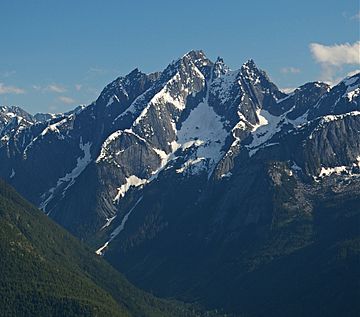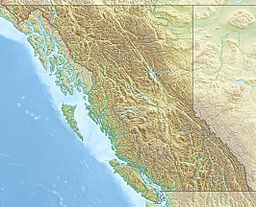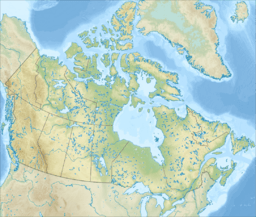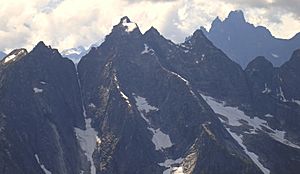Mount Rexford facts for kids
Quick facts for kids Mount Rexford |
|
|---|---|

Mount Rexford, north aspect
|
|
| Highest point | |
| Elevation | 2,329 m (7,641 ft) |
| Prominence | 555 m (1,821 ft) |
| Isolation | 5.34 km (3.32 mi) |
| Parent peak | Slesse Mountain (2429 m) |
| Geography | |
| Location | British Columbia, Canada |
| Parent range | Skagit Range North Cascades |
| Topo map | NTS 92H/4 |
| Geology | |
| Mountain type | Intrusive |
| Type of rock | Granodiorite |
| Volcanic arc/belt | Pemberton Volcanic Belt |
| Climbing | |
| First ascent | 1951 by Herman Genschorek and Walt Sparling |
| Easiest route | Scrambling |
Mount Rexford is a tall mountain in the Cascade Mountains of southwestern British Columbia, Canada. It stands 2,329-metre (7,641-foot) high. This mountain is located about 3.5 km (2 mi) north of the Canada–United States border. It's also 7 km (4 mi) west of Chilliwack Lake. The nearby Slesse Mountain is slightly taller.
Rain and snow from Mount Rexford flow into Nesakwatch and Centre Creeks. These creeks then join the Chilliwack River. The mountain was first known as Ensawkwatch. It was later named after Rexford, an early settler. He had a cabin near Slesse Creek and used to set up trap lines in the area.
Mount Rexford also has two smaller peaks. They are known as the Nesakwatch Spires. The mountain's name became official on June 2, 1950. This was decided by the Geographical Names Board of Canada. The first people to climb Mount Rexford were Herman Genschorek and Walt Sparling. They reached the top in July 1951, using the West Ridge route.
How Mount Rexford Formed
Mount Rexford is made of a type of rock called granitic rock. This rock is part of the Chilliwack batholith. A batholith is a very large mass of igneous rock that forms when molten rock cools below the Earth's surface. This rock pushed into the area about 26 to 29 million years ago. This happened after major mountain-building events in the region.
The mountain is also part of the Pemberton Volcanic Belt. This was once a chain of volcanoes. It formed when one of Earth's plates, the Farallon Plate, slid under another plate. This process, called subduction, started about 29 million years ago. Over time, these volcanoes have worn away.
Impact of Glaciers
During the Pleistocene period, which began over two million years ago, glaciers covered the land. These huge sheets of ice moved forward and backward many times. As they moved, they scraped the landscape. They left behind piles of rock and debris.
The valleys in this area have a "U" shape. This shape was carved out by these ancient glaciers. The combination of land being pushed up (uplift) and cracks forming in the Earth's crust (faulting) has also shaped the area. Together with glaciers, these forces created the tall peaks and deep valleys seen in the North Cascades today.
The North Cascades has some of the most rugged land in the Cascade Range. You can see jagged peaks, sharp ridges, deep glacial valleys, and tall granite spires. These geological events created a landscape with big changes in height. This also led to different climates and types of plants in the area.
Weather and Climate
Mount Rexford is in a marine west coast climate zone. This means it has mild, wet winters and cool, dry summers. This climate is common in western North America.
Most weather fronts come from the Pacific Ocean. They travel east towards the Cascade Range. When they hit the mountains, the air is forced to rise (Orographic lift). As the air rises, it cools and drops its moisture. This causes a lot of rain or snow to fall on the mountains. Because of this, the Cascade Mountains get a lot of precipitation, especially snow in winter.
Temperatures on Mount Rexford can drop very low. They can go below −20 °C (‑4 °F). With wind, it can feel even colder, below −30 °C (‑22 °F). The best time to climb Mount Rexford is usually from July through September. The weather is most favorable then.
Climbing Mount Rexford
Mount Rexford is a popular spot for rock climbing. Here are some of the known climbing routes on the mountain:
- West Ridge: This route was first climbed in 1951. It is rated class 4 for difficulty.
- Northeast Ridge: This route was first climbed in 1969. It is rated class 5.
- The Priest-Coupe (NE couloir): This route was first climbed in 1970. It is rated class 5.
- East Ridge: This route was first climbed in 1973. It is rated class 5.7.
- South Ridge: This route was first climbed in 1981. It is rated class 4.
- Southwest Flank: This route is rated class 3-4.
- Southeast Arete: This route is also rated class 3-4.
 | Sharif Bey |
 | Hale Woodruff |
 | Richmond Barthé |
 | Purvis Young |




